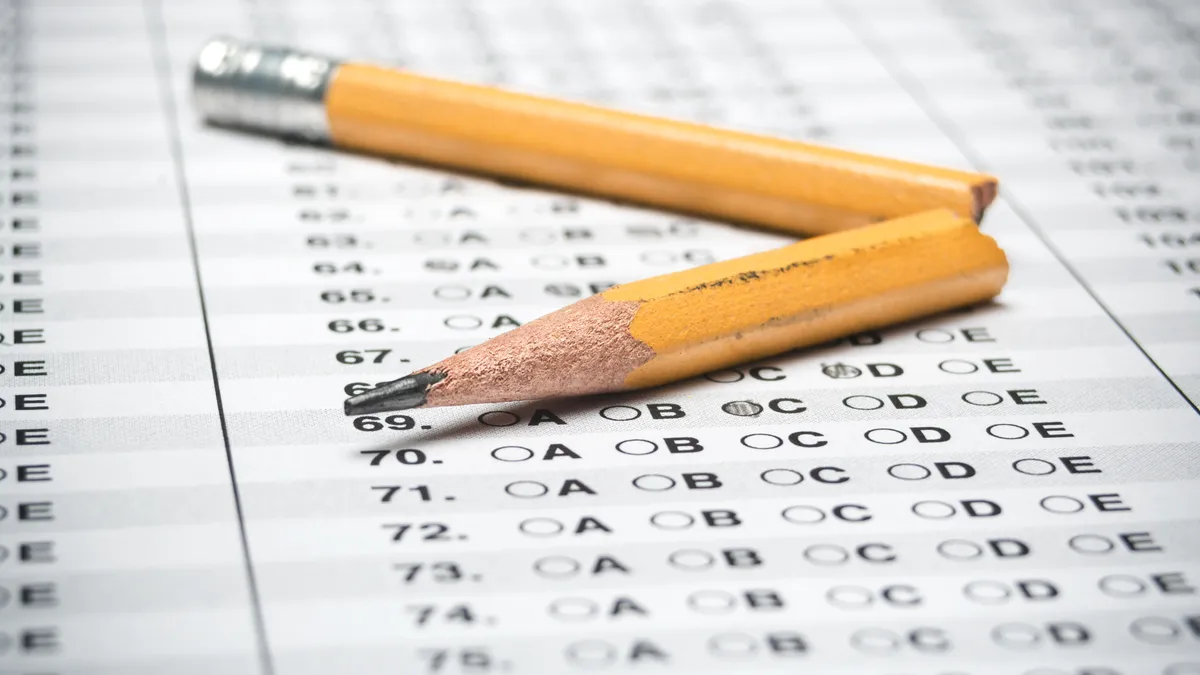Dive Brief:
- At least 1,835 four-year colleges across the U.S. aren’t requiring first-year applicants to submit SAT or ACT scores for admissions for fall 2023, a signal of the staying power of test-optional policies.
- Of those institutions, 85 are test-free, meaning they refuse to review entrance exam scores whatsoever, according to FairTest, which tracks the data. FairTest is an organization advocating for limited application of standardized assessments.
- It also found that 1,450 colleges have made test-optional and test-free admissions permanent.
Dive Insight:
Test-optional admissions proliferated across higher education during the early days of the COVID-19 pandemic.
Common testing sites, like K-12 schools, closed down, curtailing student access. In response, many colleges discarded their admissions testing requirements.
They’ve maintained those test-optional rules even as pandemic-related restrictions have eased. In addition to the broad number of colleges not demanding SAT or ACT scores for the upcoming cycle, 90 institutions have extended their policies through fall 2024, according to FairTest.
The 1,835 colleges not requiring admissions tests for fall 2023 is roughly in line with the number on FairTest's list last year, which was more than 1,800.
“Admissions without test-scores is the ‘new normal’ for this generation of college applicants,” FairTest Public Education Director Bob Schaeffer said in a statement.
Opponents of standardized testing have celebrated the shift. Many criticize the tests for fortifying admissions barriers for the most vulnerable applicants. Students from low-income backgrounds, as they can’t afford the extensive test prep their wealthier peers can.
Thus, ending testing requirements can help improve applicant pool diversity, they say.
Research and anecdotes lend credence to this argument. A 2021 study of 99 private colleges that adopted test-optional admissions found the policy led to modest gains in students from underrepresented racial and ethnic minority groups, low-income students and women.
And enrollment managers, including from University of Pennsylvania, reported a significant uptick in applications under test-optional rules, particularly from students of color.
Not every institution has continued to waive standardized testing requirements. The Massachusetts Institute of Technology announced in March it was reinstating admissions testing, saying those scores helped predict whether students would succeed on campus, especially in mathematics.
The National Association for College Admission Counseling is leading a more comprehensive study with a $1.4 million grant from the Bill and Melinda Gates Foundation to examine the effects of test-optional admissions.
Testing providers — the ACT, which shares the name of the exam it administers, and the College Board, which administers the SAT — have defended their products. The companies have bled revenue as students abandoned the tests.
About 1.4 million students in the high school 2022 graduating class took the ACT, a far cry from the 2.1 million students in the 2016 graduating class who did so. Roughly 1.7 million students in the 2022 graduating class took the SAT, down from 2.2 million in each of the 2019 and 2020 graduating classes.
Both companies have acknowledged admissions inequities but maintain their tests do not contribute to this problem. They say the exams can link low-income students to scholarships and offer them opportunities to showcase their academic prowess.














